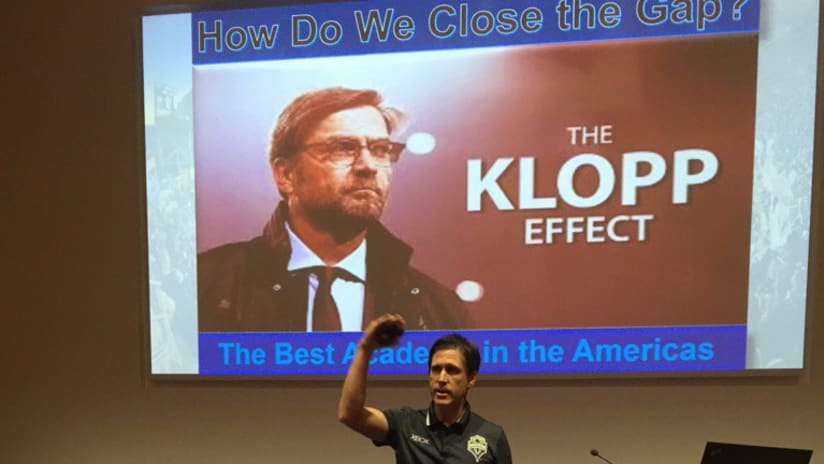Seattle Sounders FC Academy coach Sean Henderson recently completed the year-long Elite Formation Coaching License course.
In an effort to increase the quality of player development throughout the United States, Major League Soccer partnered with the French Football Federation back in 2012. The EFCL is a product of this union, and it’s the same coaching license that every French academy director is required to hold.
For Henderson, the EFCL course was a culmination of his 20 years of coaching youth soccer. He’d already completed all of his U.S. soccer coaching badges and, as a result, possessed a strong understanding of the game. These courses are akin to attending a prestigious college and majoring in soccer. You gain a holistic understanding of the game and an excellent foundation for a coaching career.
The EFCL is like attending a graduate program that specializes purely in producing elite academy level players. There are classes, lectures—homework based on those lessons—presentations and exams. In order to succeed in the EFCL program you need that sturdy foundation and understanding of the game provided by the U.S. Soccer courses.
The French Federation believes that every club and coach is different, so the course is geared toward specialization of each coach’s strengths and philosophies. Doing so empowers them develop top quality academy level players with ambitions of first team football.
Every MLS club is required to send one director or full-time coach to take part of the EFCL in each annual cycle. There are essentially six ‘classes’ these coaches must take. The first took place at Clairefontaine—the French national training center located on the outskirts of Paris.
Every coach then spends a week with a top European club observing their youth system. This visit is quite literally studying abroad.
Henderson visited the famed Valencia C.F. youth system observing constructs such as training methodology and youth system integration. Afterwards, his homework was to create, submit and implement ten training sessions with Sounders based upon his observations.
The next four ‘classes’ took place at various MLS youth academies. Henderson and his classmates spent a week each at Philadelphia Union, Atlanta United, New York Red Bulls and Sporting Kansas City. Each visit focused on different aspects of player development such as exercise science or coaching the mental side of the game.
After each visit the coaches were required to draw up ten training sessions that focused on what they learned during previous visit. This homework entailed running the sessions, filming them and submitting to the course directors. Additionally, they had projects and ‘midterms’ throughout the year-long process to assess whether they truly understood the material.
“There is a huge difference between memorizing something and actually having to figure it out,” said Henderson. “You get smarter players and coaches when you have to analyze a situation, identify the problem and implement a solution.”
For example, every coach picked an important game principle and created a year-long curriculum for how they would develop this in a young player. Henderson selected finishing and all of the little constructs that make up a lethal goal-scorer: occupying dangerous spaces, movement in the final third and adjusting ones feet for precise finishing.
Additionally, MLS Director of Player Development Fred Lipka spent a week visiting each of the clubs participating in the program. Henderson spent hours on the training pitch with Lipka. They subsequently poured over film of his training sessions to identify his strengths, as well as areas for improvement.
“Before the course I had trouble knowing whether was actually bringing out a specific topic in a training session,” said Henderson. “For matches it was tough for me to make in-game adjustments to exploit the strengths of my teams and the weaknesses of the opposition.”
The methodology of the EFCL course often times resembled the Sounders Academy philosophy for developing intelligent and autonomous soccer players. Similarly, the EFCL aims to produce coaches that can analyze a situation, identify the issue and implement a solution on the fly.
At the end of the twelve months came the dreaded finals week. All of the coaches returned to Clairefontaine for one last round of assessment. Henderson gave a 25-minute ‘experience report’ on his personal growth throughout the program. He then took a cumulative written exam that could draw upon anything from the lessons. His last final was to run a brief training session in order to evaluate whether he applied the lessons learned to his coaching style.
- TICKETS: Join the Sounders for the first leg of the Western Conference Championship at CenturyLink Field
Given the grueling nature of the course, not all of the coaches pass on the first go-around. After countless hours in the classroom and on the pitch, Henderson passed the course.
He feels he is a much better coach as a result, and that what he learned will only go on to benefit the players coming through the Rave Green youth system.
“I was really lucky to go through the program,” Henderson said. “It not only changed the way I run training sessions, but also what I look for in scouting and developing players. I learned at the younger ages it’s important to bring in intelligent players who may be a bit smaller. We may lose games at the U-12 level as a result, but that sacrifice means by the time they become U-18s we will have developed plenty of technical, creative and problem-solving soccer players.”
With both Henderson and Academy Director Marc Nicholls now possessing the EFCL badge, the Sounders organization stands to benefit from a sustainable pipeline of young players all the way through to the first team.





